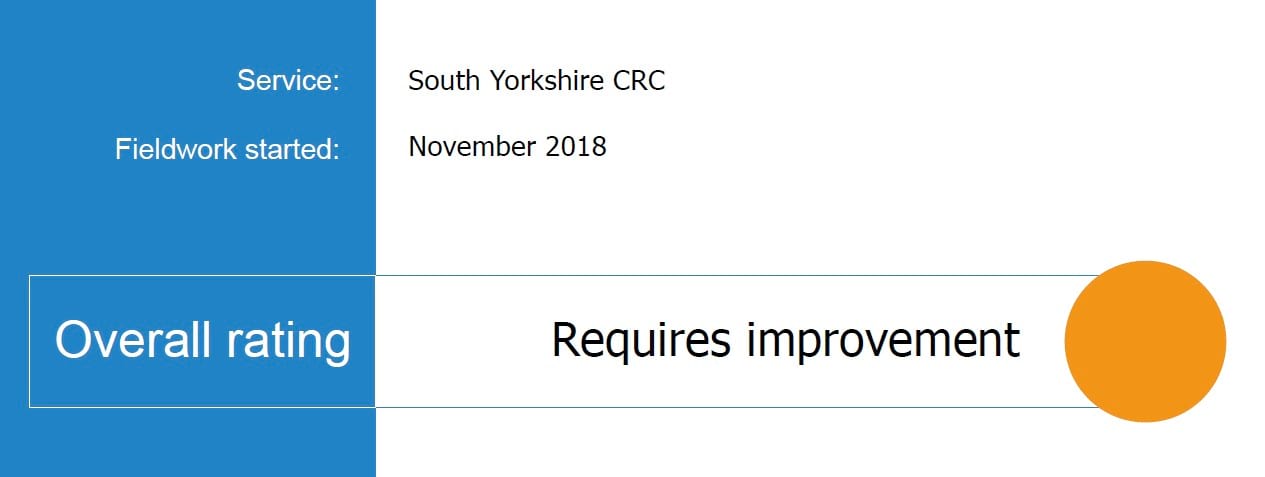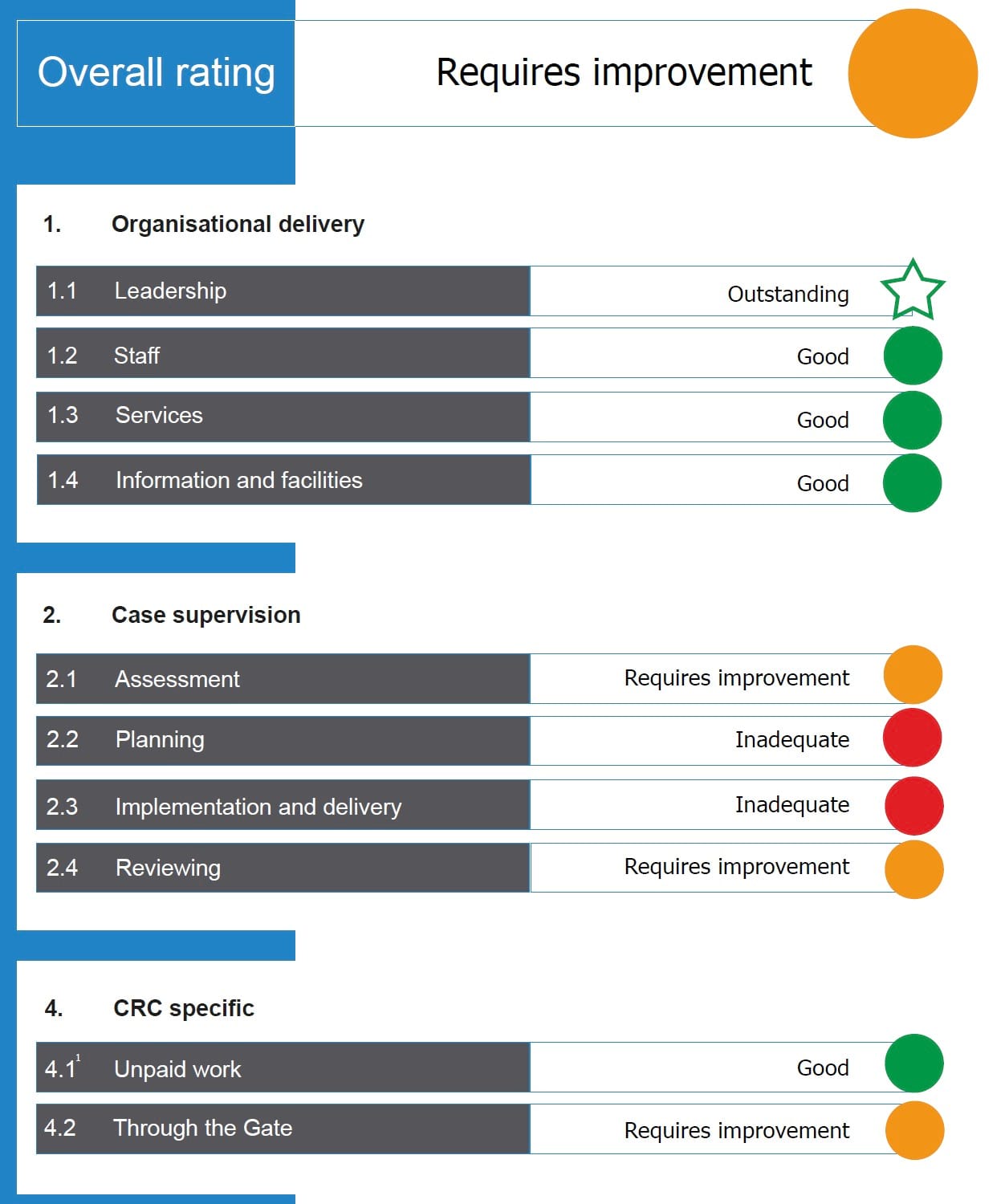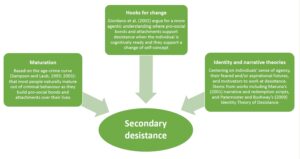Alarming levels of unqualified staff
South Yorkshire Community Rehabilitation Company (SYCRC) was assessed by probation inspectors as ‘Requiring improvement’, the second lowest rating, in a new inspection report published today (29 March 2019). SYCRC is the third Community Rehabilitation Service run by Sodexo to be inspected in the current programme.
HM Chief Inspector of Probation Dame Glenys Stacey praised the CRC’s response to previous criticisms by the inspectorate regarding its supervision of low risk offenders by telephone only.
However, the inspectors found several issues of concern, as set out by the Chief Inspector in her foreword to the report:
The rates and frequency of reoffending here are comparatively high. In response, senior leaders are working with partner agencies on a laudable initiative to prioritise resources to those who are most frequently arrested. The CRC must be sure to take the right steps in these and other cases. More accredited programmes are needed, along with interventions to improve individuals’ accommodation and employment prospects.
The number of qualified probation officers that the CRC employs has fallen considerably since 2015. Alarmingly, although individual workloads are not generally excessive, the large majority of probation staff here are not qualified, and many are not sufficiently experienced at managing risk of harm to others. The CRC is training staff to achieve the Professional Qualification in Probation (PQiP), and putting substantial effort into quality management, but, at present, the skills gaps are reflected in the poor quality of assessment and planning work with individuals.
Unpaid work delivery in this CRC is good, but urgent improvements are needed to the rest of its work, and in probation supervision overall. There have been too many changes of practitioners for individuals under supervision, and those practitioners have also experienced changes in line managers. That needs to stop now, so far as possible, and leaders must concentrate on improving the skills base, and with it the quality of work delivered.
Key findings
Inspectors organised their key findings under three main headings: organisational delivery; case supervision and unpaid work & through-the-gate.
Organisational delivery
Inspectors’ main findings on this domain were mainly positive.
- Leaders are very effective at engaging with local partners to reduce reoffending, driving up performance and demonstrating best practice in quality assuring services.
- In a competitive market, the CRC is striving to retain experienced staff and is training existing staff to qualify as probation officers. Staff are well motivated and have reasonable workloads; however, many managers have recently taken up post and many practitioners lack depth of knowledge and skills in
assessing and managing risk of harm to others. - A range of innovative services are provided by the CRC and operational partners to meet diverse needs and situations; however, there is only one accredited programme available, and key sentencers lack knowledge of, and confidence in, what services are provided.
- Staff are supplied with up-to-date-guidance and practice directions, and supported with modern flexible information and communication technology (ICT). Premises are welcoming but have insufficient confidential interviewing space.
Case supervision
Inspectors were unimpressed by the general standard of casework:
- The assessment of risk of harm to others and the analysis of factors linked to offending were often inadequate, with too little attention given to the information already available; however, more recent assessments, using the
- full (layer 3) Offender Assessment System (OASys), have shown improvement.
- Too many plans failed to involve the individuals concerned or were not personalised or detailed enough, and in some instances there was confusion about what was planned, arising from changes in case managers.
- Individuals are all now seen face-to-face. Delivery of supervision and interventions was too often inconsistent, however, made worse when there were several changes of case managers. In many cases, enforcement was
- not rigorous enough and, in about half of relevant cases, insufficient attention was given to the likelihood of individuals causing harm to others.
- Most cases inspected had had a full review completed recently, with sufficient attention given to engaging individuals and addressing offending-related factors. Reviews were not always completed following an important event, however, and, in too many relevant cases, changes in factors linked to the likelihood of causing harm to others had been missed.
Unpaid work
Unpaid work was rated as good:
The delivery of unpaid work is good, with enthusiastic staff and a wide range of appropriate placements. Attendance needs to improve and there is scope to increase the number of education and training opportunities available.
Through the Gate
However, through the gate work was unsatisfactory:
Resettlement plans were generally adequate, but links to risk management plans were not robust enough. The range of interventions available needs strengthening, and communication with community services requires
improvement.
Conclusion
The Probation Inspectorate works on a four-band rating system: excellent, good, requires improvement and poor. This is the eleventh inspection of a CRC under the new rating system and ten areas have been rated in the second to lowest band: “requiring improvement”, the only exception being the even worse “inadequate” rating given to the Dorset, Devon & Cornwall CRC when it was run by the now defunct Working Links.
I have been compiling an unofficial league table of probation performance based on the inspectorate’s ratings. The table has been updated today and shows South Yorkshire CRC, despite its failings, is rated as the equal best performing CRC, although there is a big gap between its ratings in the organisational delivery category and that of its core activities of case supervision and resettlement work.










One Response
ah once again leadership is great, nothing to do with them, its the plebs fault